TL;DR:
The Rebased IOTA Mainnet will be launched by a set of highly trusted validators in a special Genesis Ceremony. They will ensure the secure and effective transition of the IOTA network and all assets from the previous “Stardust” protocol to the new Move-based protocol in a decentralized manner.
The IOTA network has undergone several huge changes throughout its history as the protocol matured. With IOTA Rebased, our largest and most complex technical upgrade and change, we have arrived at this point again.
Following the decision of IOTA token holders, it is now time to transition IOTA into a fully decentralized, delegated Proof of Stake network. This upgrade, known as IOTA Rebased, is scheduled for 05.05.2025.
A well-planned and structured process is necessary to ensure a flawless transition of all user funds, assets, and data from the current IOTA Stardust network to the new IOTA mainnet. The announcement blog post provides more details on the Ceremony.
The Genesis Validators
Our goal has always been for the IOTA network to operate in a truly decentralized manner. To achieve this, a group of 13 Genesis Validators will come together to perform the Genesis Ceremony, giving birth to the new network, ensuring that no single entity will ever be in control.
All of the Genesis Validators have the expertise, professional skills, and performance capabilities required to launch the new network in a decentralised manner. In the last five months, these entities have collaborated to prepare for the launch and to resolve technical issues and updates. Their efforts and proven track record provide a reliable foundation for the launch of the new network.
The following thirteen entities will give birth to IOTA Rebased as its Genesis Validators:
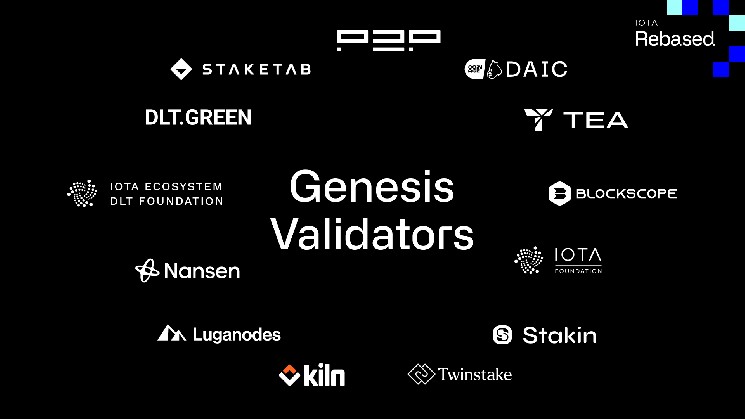
- IOTA Foundation: The German non-profit Foundation that has steered the research and development of IOTA since 2017.
- IOTA Ecosystem DLT Foundation: The IOTA Ecosystem DLT Foundation is the first DLT foundation registered with the Abu Dhabi Global Market in the United Arab Emirates.
- Tangle Ecosystem Association: Another strong ecosystem organization supporting IOTA, TEA was established as a Swiss association.
- DLT GREEN: The first tokenized company in Austria that emerged from the IOTA community, DLT GREEN is dedicated to the development, deployment and operation of modern service provider models – especially for decentralized IT infrastructures for the IOTA ecosystem.
- P2P: Founded in 2018, P2P provides a non-custodial staking infrastructure with over $7 billion in staked assets across 40 networks. It supports more than 90,000 delegators and 130+ institutional clients
- LugaNodes: Prioritizing security and compliance, LugaNodes is one of the first staking providers to adhere to SOC 2 Type II, GDPR, and ISO 27001 standards, and offers chainproof insurance to institutional clients. It has over $2.5 billion in assets staked across more than 45 networks
- Twinstake: With a unique heritage of deep expertise in the digital asset industry and a strong understanding of traditional finance, Twinstake brings a wealth of experience and proven capabilities to the IOTA ecosystem.
- Kiln: Managing over $11 billion in stake across 50+ Proof-of-Stake networks, Kiln operates an impressive 5% share of Ethereum’s staking power. It is trusted by prominent industry names such as Metamask, Trust Wallet, Crypto.com, Fireblocks, and Bitpanda.
- Stakin: A leading institutional-grade Web3 infrastructure and non-custodial staking service provider, Stakin has operated highly available blockchain validator nodes (99.9%+ uptime) across 40+ networks since 2018. Today it has more than $3 billion in delegated assets.
- Nansen: A leading multichain analytics platform, Nansen delivers real-time on-chain intelligence to traders, investors, and builders. Through AI-powered tools and surfacing actionable insights, Nansen empowers users to navigate crypto markets with confidence, enabling on-chain discovery, due diligence, and defense for your crypto portfolio. Today, it has over $900 million AUM, with over 25+ leading chains supported and many more to come.
- Blockscope: With over $250 million in Total Value Locked, support for 30 blockchains, and a growing base of more than 4,500 users, Blockscope is well-positioned to offer a dependable staking experience. Backed by a decade of hands-on experience in the installation, deployment, and maintenance of high-performance corporate services, Blockscope brings a lot of expertise to the table.
- Coinage x DAIC: A collaboration between community and tech experts, Coinage x DAICforms one of the most trusted community validators in Web3. It delivers high-quality contributions to over 40 networks. Its goal is to provide early support and help projects build genuine, engaged communities.
- Staketab: With over $410 million in Total Value Locked, 90 networks supported, and an impressive 99.99% uptime, Staketab offers a reliable and secure option for IOTA stakers. In addition to its extensive staking expertise, Staketab is recognized for contributing to the IOTA ecosystem, including developing the new IOTAscan explorer.
The 13 validators will each independently create and verify the Genesis state of the new IOTA Mainnet. This state is a 1:1 transfer of the final ledger state from the previous IOTA Stardust network. During the Genesis ceremony, all addresses and balances will be thoroughly validated to ensure they are transferred correctly and that every IOTA token is accessible to its rightful private key holder, exactly as it was in the Stardust network.
Why only 13 Genesis Validators?
One of the biggest obstacles we’ve identified to a successful Genesis process is managing the communication complexity required to ensure that every Genesis Validator acts correctly and promptly. The engineering teams must handle issues swiftly, adding another layer of difficulty to an already delicate process.
Through internal testing of the Genesis Ceremony and “test runs” with the Genesis validators, it became clear that increasing the number of validators in the set would drastically extend the time required to complete the ceremony steps and multiply the complexity of resolving potential issues, while the decentralization and security aspects only increases marginally with every additional Genesis Validator.
As we don’t have the opportunity to perform a “silent” launch of the new IOTA Mainnet several days before the upgrade, which is the common method of launching a completely new network nowadays, and makes it easier to ensure everything runs smoothly, we’ve prioritized minimizing the IOTA Mainnet’s downtime during the transition to the Rebased protocol.
Validator Onboarding and Delegation
Once the network is running and the final checks have been completed, we will provide the necessary infrastructure (API endpoints, Wallet, and Explorer) for users to interact with it. In the following Epoch (roughly 24 hours), new validators can join the network, decentralized and permissionless, based on the decision and delegation of IOTA stakers.
Validators who qualified for delegation during the Public Testnet phase will receive delegated funds from the Foundation’s treasury gradually to ensure a secure and manageable bootstrapping of the Mainnet. We expect the network to reach its current full committee size of 50 active validators within five Epochs.
The ranking of validators in this 50-seat committee depends purely on the amount of delegation they receive from IOTA token holders. The set of validators in the committee will be determined for every new epoch (24 hours) based on the delegation amount achieved till the end of the previous epoch.
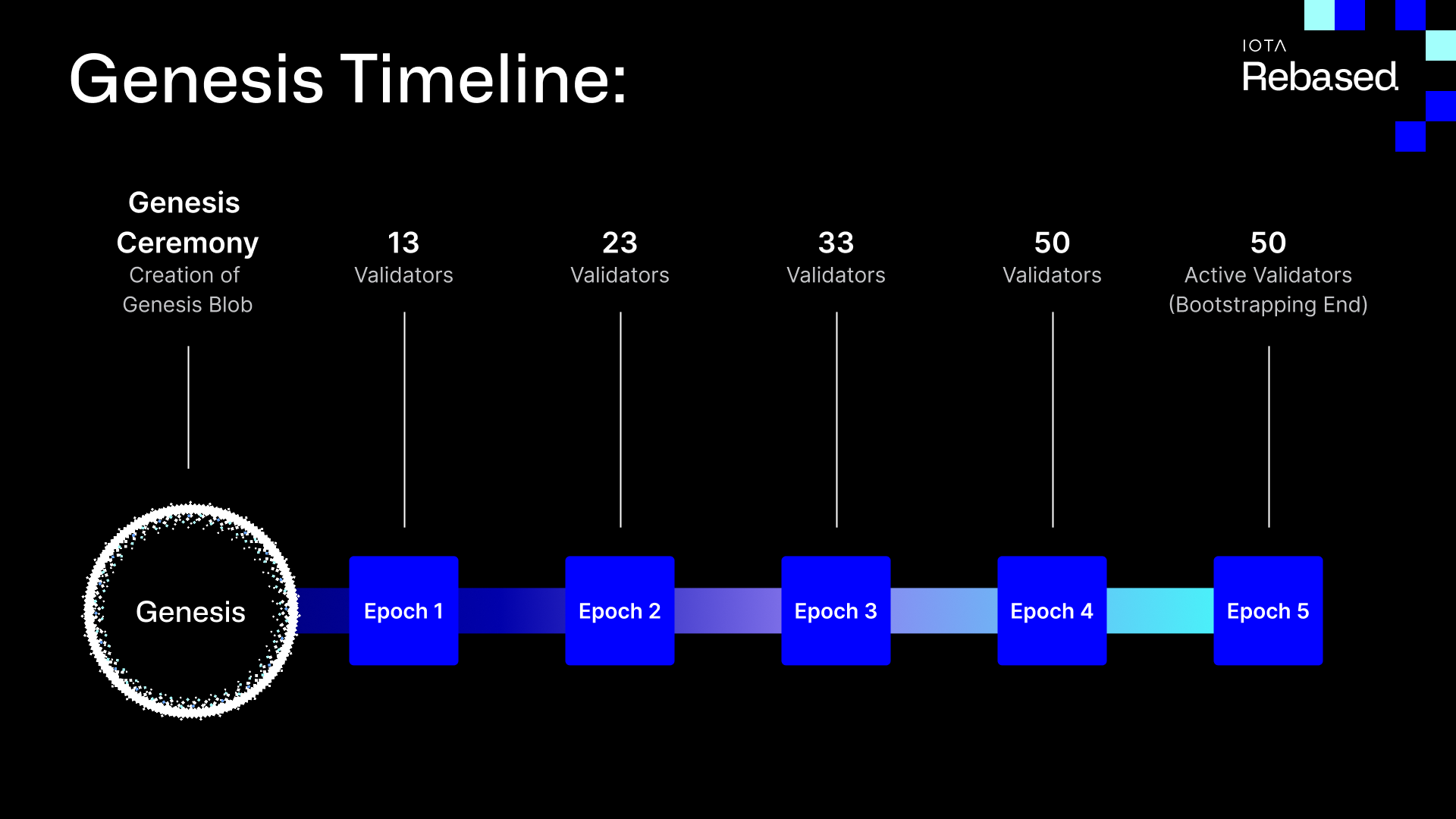
Conclusion
With the IOTA Rebased transition underway, the birth of the new IOTA Mainnet marks a pivotal moment for IOTA. As the phased rollout progresses over the coming epochs, validators will gradually receive their full delegations, strengthening the network’s stability and resilience. Once fully operational, the IOTA Mainnet will unlock new opportunities for users and developers while laying the groundwork for decentralized applications to thrive in the IOTA ecosystem.





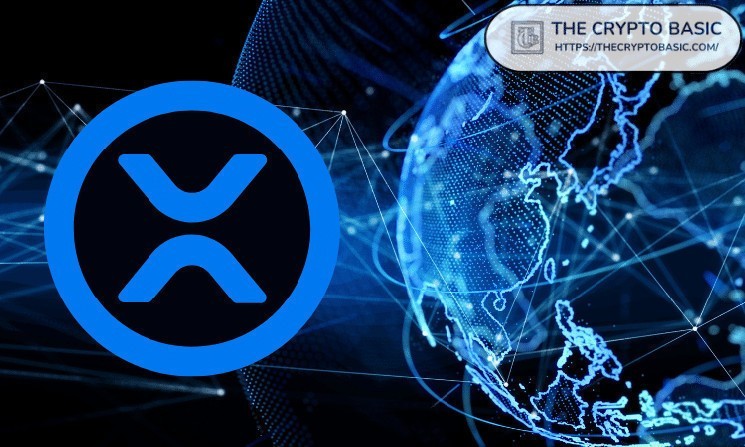
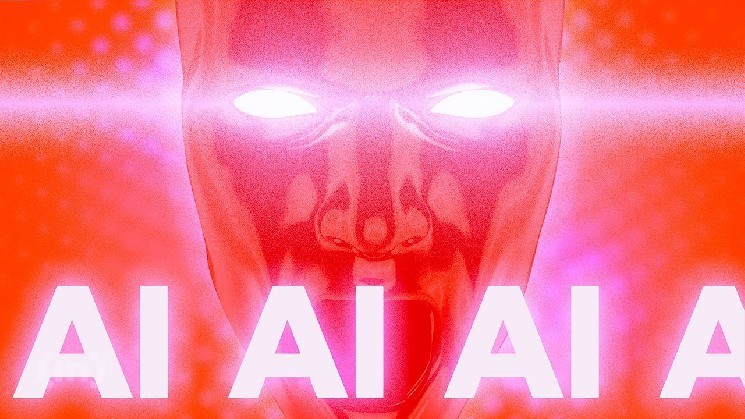

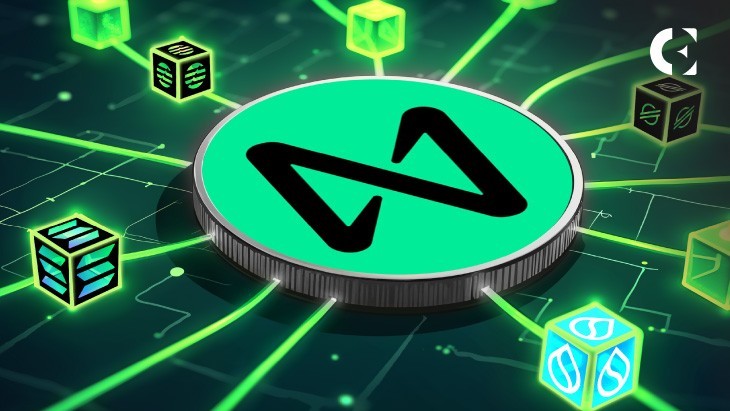




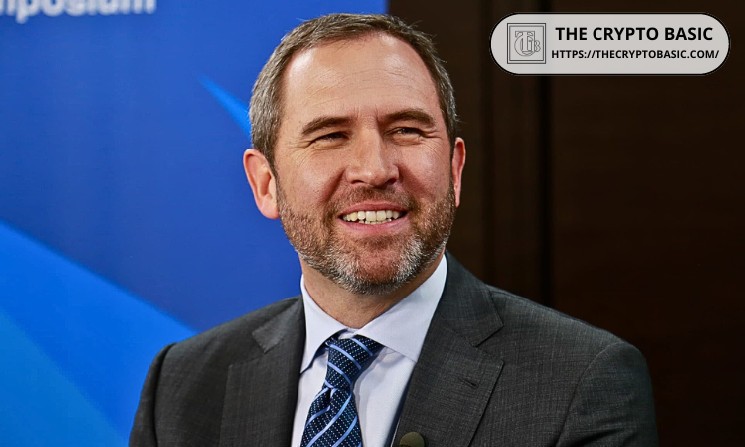
Leave a Reply